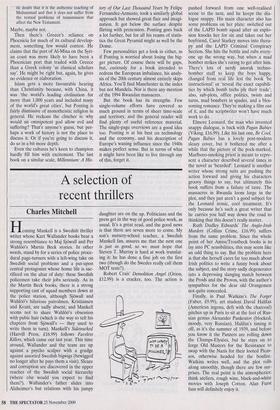A selecti©n of recent thrillers
Charles Mitchell
Henning Mankell is a Swedish thriller writer whose Kurt Wallander books bear a strong resemblance to Maj Sjiiwall and Per WahlOo's Martin Beck stories. In other words, stand by for a series of police proce- dural page-turners with a left-wing take on Swedish social problems and a put-upon central protagonist whose home life is sac- rificed on the altar of duty: these Swedish policemen take their jobs seriously. As in the Martin Beck books, there is a strong supporting cast of squad members down at the police station, although SjOwall and Wahloo's hilarious patrolmen, Kristiansen and Kvant, are sadly absent, and Mankell seems not to share Wahloo's obsession with pubic hair (which is the way to tell his chapters from Sjowall's — they used to write them in turn). Mankell's Sidetracked (Harvill Press, £16.99) follows Faceless Killers, which came out last year. This time around, Wallander and the team are up against a psycho scalper with a grudge against assorted Swedish bigwigs (bewigged no longer after he pays them a visit). Sleaze and corruption are discovered in the upper reaches of the Swedish social hierarchy (where else would you expect to find them?). Wallander's father slides into Alzheimer's but relations with his jumpy daughter are on the up. Politicians and the press get in the way of good police work, as usual. It's a great read, and the good news is that there are seven more to come. My son's nursery-school teacher, a Swedish Mankell fan, assures me that the next one is just as good, so we must hope that Steven T. Murray is hard at work translat- ing it: he has done a fine job on the first two (though do the Swedes really call them MOT tests?).
Robert Crais' Demolition Angel (Orion, £12.99) is a cracker, too. The action is pushed forward from one well-realised scene to the next, and he keeps the dia- logue snappy. His main character also has some problems on her plate: switched out of the LAPD bomb squad after an explo- sion knocks her for six and takes out her boyfriend, Carol Starkey moves into thera- py and the LAPD Criminal Conspiracy Section. She hits the bottle and rubs every- one up the wrong way, but when a mad bomber strikes she's raring to get after him. There's lots of nerdy anorak techno- bomber stuff to keep the boys happy, changed from real life lest the book 'be instructional' or 'reveal the exact capabili- ties by which bomb techs ply their trade'; also, sub-plots, office politics, twists and turns, mad bombers in spades, and a blos- soming romance. They're making a film out of it, and the scriptwriter won't have much work to do.
Elmore Leonard, the man who invented snappy dialogue, is back with Pagan Babies (Viking, £16.99). Like his last one, Be Cool, Pagan Babies has a lovely post-modern sleazy cover, but it bothered me after a while that the picture of the pock-marked, Marlboro-smoking priest is meant to repre- sent a character described several times in the novel as 'bearded'. Leonard is another writer whose strong suits are pushing the action forward and giving his characters groovy things to say, but ultimately this book suffers from a failure of taste. The massacres in Rwanda loom large in the plot, and they just aren't a good subject for the Leonard ironic, cool treatment. It's only because he's such a great writer that he carries you half way down the road to thinking that this doesn't really matter.
Ruth Dudley Edwards' The Anglo-Irish Murders (Collins Crime, £16.99) suffers from the same problem. Since the whole point of her Arniss/Troutbeck books is to lay into PC sensibilities, this may seem like an odd thing to say. But the problem here is that she herself cares far too much about Irish politics to write a funny book about the subject, and the story sadly degenerates into a depressing slanging match between the Prods and the Provos, with the author's sympathies for the dear old Orangemen not quite concealed.
Finally, in Paul Watkins's The Forger (Faber, £9.99), art student David Halifax (American ingenu, deft with the charcoal) pitches up in Paris to sit at the feet of Rus- sian genius Alexander Pankratov (blocked, moody, very Russian). Halifax's timing is off, as it's the summer of 1939, and before you know it the Panzers are rolling down the Champs-Elysées, but he stays on to forge Old Masters for the Resistance to swap with the Nazis for their looted Picas- sos, otherwise headed for the bonfire. Watkins writes well, and the plot rolls along smoothly, though there are few sur- prises. The real point is the atmospherics: think ateliers, rough wine, black-and-white movies with Joseph Cotton. Alan Furst fans will definitely enjoy it.





























































































 Previous page
Previous page